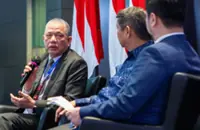JAKARTA: Indonesia is aiming for more oversight of the fast-growing peer-to-peer (P2P) lending industry, which has benefited many individuals and small businesses seeking modest sums from as low as 500,000 rupiah (US$30).
Since July, financial technology firms in the microfinance sector have been required to submit their financial transactions and file financial reports to the Financial Services Authority (OJK).





